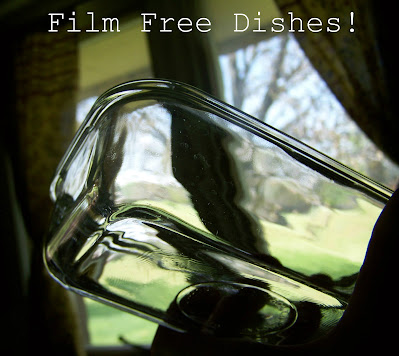
For a period of time we handwashed all of our dishes because the new phosphate free detergent wasn't getting our dishes clean and was actually leaving a nasty film on the entire load of dishes.
I happened upon a homemade recipe for dishwasher detergent which worked well for some time. See my recipe here Truly Amazing Homemade Dishwasher Detergent. The film was less noticeable but dishes weren't completely squeaky clean after a few months of using the homemade detergent. Still, it was acceptable.
We recently moved to home on the outskirts of town. We love being out of the main part of the city but our water supply is hard. Once again, we were dealing with a yucky film on our dishes. I tried a commercial detergent again, thinking perhaps the formula had improved since last time. But the results were not good.
 |
| This was the inside of our dishwasher door. There were smudges and stains that weren't coming off after multiple washes. These smudges were there from the previous occupants. Yuck! |
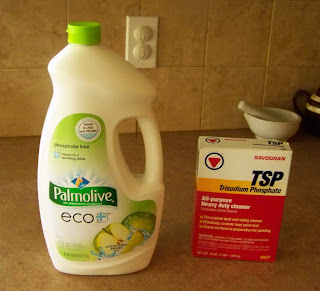 |
| I'm a dirty rotten cheater! But to the best of my knowledge, I'm not a lawbreaker! I did a little bit of research and found that I could mix a little phosphate into each wash load. I found a box of trisodium phosphate on the internet. You can purchase it here - Savogran 10621 Trisodium Phosphate (TSP) for about $7. Most sources I found suggested to add approximately a 1/4 to a 1/2 teaspoon to each load. I purchased the box approximately six weeks ago and we still have a TON left so I'd say that adding TSP is very economical. Once I run out of the commercial dishwashing detergent, I'll probably go back to my homemade recipe and add the trisodium phosphate to it. |
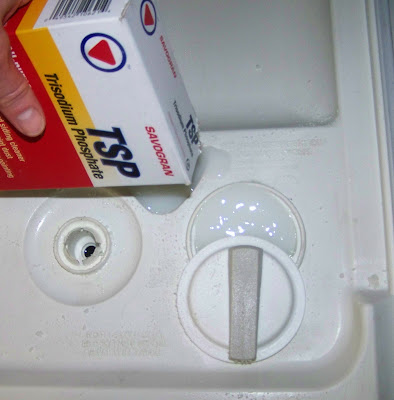 |
| I just sprinkled about 1/4 tsp of the Trisodium Phosphate into both detergent cups on top of the detergent. |
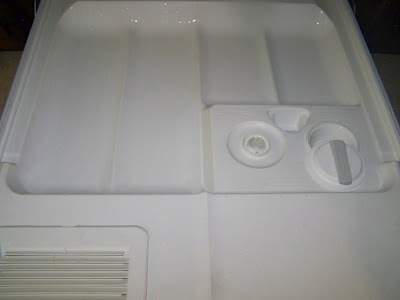 |
| As you can see, the inside of the door is no longer disgusting! |
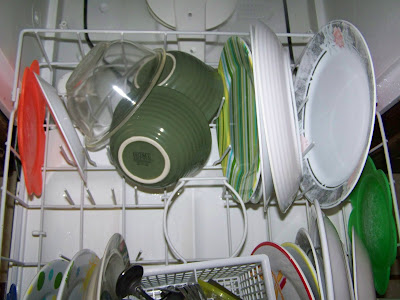 |
| Dishes are clean!!! I've noticed a few hard water spots but I'll bet a little vinegar in the "rinse aid" dispenser would take care of that issue. |
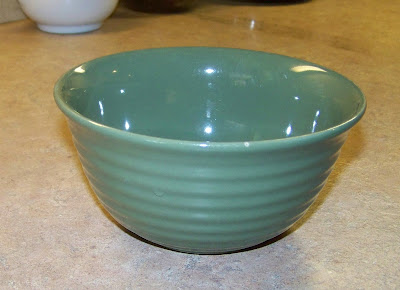 |
| No more gunk, no more powdery film! |
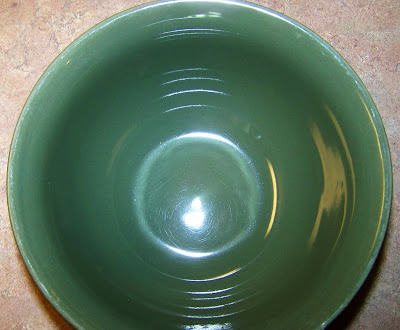 |
| See? Nice and shiny! |
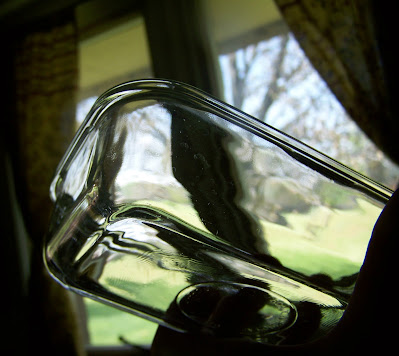 |
| I can see through my glass again! It worked! If you would like to read more about trisodium phosphate you can read this article wikipedia - Trisodium phosphate or Natural Handyman - TSP Cleaning For Big Dogs! |
What damage to the environment, you say? Well, the story goes that the release of vast quantities of phosphates into the open environment caused a shift in the balance of life in lakes, rivers, and streams. Phosphate-loving algae flourished, removing much of the oxygen from the water due to their rapid reproduction, leaving other plant and animal life at risk. In the early '70's, limitations on the use of phosphates were implemented in the US and Canada.
ReplyDeleteWhen reading more of the story, I found it interesting to note that the primary source (70-80%) of phosphates released into the open environment were and continue to be from fertilizers. Also interesting to note that some states have banned or limited use of phosphate fertilizers for lawn use but have exempt agricultural (commercial farmers, etc.) use of phosphate fertilizers from this ban. Agricultural use of phosphate fertilizers comprises something like 50% of all phosphate use.
Delete@Anonymous
DeleteThe operative word in your reply is "vast". Your overall story is true at the industrial level. But 1/4 of a cup per wash is not going to cause the changes you refer to; not even over a long period of time. The reason it's scaled back commercially is because the benefit of that scaling outweighs the costs. But, in specific examples like this one, TSP is not dangerous. It's the chemical and the context in which it is used that should spur a decision like this.
Having said that, @Poppy... I was going to ask, have you tried a lesser amount per wash? I've used a 1/4 cup in 2 gallons of water with chlorine to do heavy-duty house/carport cleaning and that goes a long way. Have you tried maybe a half-teaspoon to see if you get the same result? I'm just curious because I'm going to try this as well and was looking to see what other experiences were.
Thanks for the additional information Anonymous #2. I only use about 1/4 teaspoon,per detergent cup (dispenser) not 1/4 cup per load. I re-read the article and can see that the instructions could be confusing. Yes, 1/4 cup would be way too much and unnecessary. Thank you for pointing this out. Have a great day!
DeletePlease do just a bit of reading. Trisodium phosphate isn't a contributor to algae blooms. If you want to blame a phosphorus product for algae, it's those compounds which were designed specifically to fertilize vegetation. That is, mono-potassium phosphate fertilizers. TSP, the major cleaning component of detergents, is the end result of a reduction process - which makes it more difficult to be absorbed by organic processes.
Deletehttp://www.weeklystandard.com/articles/another-triumph-greens_536862.html?page=3
As noted in there, even the green freaks admitted that _detergents weren't the problem_. But that they should be attacked anyway! Which is better for the environment? Washing your dishes four times, or just once, while putting some phosphorus in the water?
The latest science is that the type of phosphates in TSP, and which were formerly in dishwashing and laundry detergents, have no affect on algae blooms.
Delete... and even if it did cause algal blooms, algae takes CO2 out of the atmosphere, reducing our carbon footprint.
DeleteHmmm... gets complicated, doesn't it?
;-)
Not to mention modern sewage systems are very effective at removing all phosphates from the system. Just another case of the greens fixing something that is not a problem. Algae blooms come from agriculture not households.
DeleteJust like the idiotic low flow toilets. Industry and agriculture use 98% of the water, so yah we save 5% of 2%.
I don't know how much research supports TSP being a non-issue even if it were to build up, but I can understand minimizing phosphate usage where it's not key to product performance. In laundry detergent it may not be as important, but in dishwasher detergent it seems to be. And dishwashers tend to use less water and (actual) detergent than many clothes washers anyway.
DeleteBTW, anon is only correct about CO2 removal if that algae happens to sink into the cold depths upon death. Otherwise it cycles back to the atmosphere pretty quickly via the food chain and decomp. ;-)
Bulls***. The major contributor of phosphate in the environment is the runoff from cow populated pasture land. The untreated manure contaminated water is high in phosphates AND E. Coli.
DeleteBe cautious with your glassware, the high alkalinity (pH) of TSP can contribute to glass fogging, but it is less of an issue with hard water. Industry used STPP (sodium tripoly phosphate) for laundry and dish consumer formulations.
I use this stuff from time to time. Cascade Platinum packets have worked well but now after being down to one job, TSP is back with cheaper detergents and works well.
ReplyDeleteI used to use TSP but switched to Cascade Platinum packets and it worked great but got expensive. After losing one of my jobs, its back to TSP and a cheaper detergent. You can also find it at Lowes or Home Depot or Ace Hardware or TruValue
ReplyDeleteI use this stuff from time to time. Cascade Platinum packets have worked well but now after being down to one job, TSP is back with cheaper detergents and works well.
ReplyDeleteIt's tempting to rationalize when we want to save some aggravation. I would be lying to say I haven't done the same at times. But the problem with phosphates is a serious one and really should have been addressed long ago.
ReplyDeleteIf your water is that hard, try using a real rinse aid instead of vinegar. Dishwashers are designed with the assumption that these will be used and part of their purpose is to prevent the hard water buildup you are using the TSP to eliminate. A store brand works fine and is quite cheap.
David, the assertion the the type of phosphates used in dishwasher detergent was a problem for the environment turned out to be junk science
DeleteLike so much environmental "science," going back to Rachel Carson.
DeleteJust wondered if you'd gone back to the homemade recipe with added TSP. If so, has it worked well?
ReplyDeleteIf you do a search online for Spokane regional wastewater phosphorus bio-availability study,and it's author, MIchael Brett, you'll find real science. The suggestion is that simple phosphorus compounds are assumable by simple plant forms such as algae. Complex molecular compounds are not. Guess in which category sodium tripolyphosphate lives? (Sodium triphosphate by another name). Guess what's in detergent. Guess which is in commercial fertilizers?
ReplyDeleteTSP isn't the boogyman, and it's not unnatural. It's simply a chemical. Overuse of anything often causes issues, of course. Oh - some of the hard water spots might be leftover from the TSP.
Our politicians and the 'Greens' are generally pretty simple-minded people. They see or hear of -one- cause of a problem, automatically assume that anything related to that is part of the problem, and try to ban it all. Facts and science don't enter into it - heard anything about the 'hole in the ozone layer' lately? How about 'Global Warming'. Wait, that's now 'Climate Change' after enough people were caught playing with the numbers.
Don't jump to conclusions - and make sure your local politicians aren't allowed to do so either.
You're giving that research *way* more credit than it deserves. It was small, and inconclusive. That's why funding for further research was canceled by the state.
DeleteIf you were to actually research the subject before jumping on the misinformed government bandwagon to 'clean up' the environment you'd find that it's not even TSP that was causing the problems in Washington state, but another phosphate all together! But will the government reverse their opinion and admit they were wrong, hell no! So don't gimme that do goodie good bullshit.
ReplyDeleteWow. Really? What an ass.
Deleteanon July 28, you are the "a." you are relying in debunked junk science. The phosphates which were used in dishwasher detergent and are in TSP are not a problem for the environment.
DeleteI used TSP in my dishwasher for about a year in the quantities mentioned here and it stained the inside of my dishwasher and also yellowed my silverware. I can polish the yellow off, but it returns even though I quit the TSP ages ago. Don't try this.
ReplyDeleteanon July 21, it is literally impossible for it to have yellowed your silverware or stained your dishwasher. In your case you were not using enough.
DeleteThat's not impossible. I had the same experience. I found this recipe for adding TSP to dishwasher detergent and used it just as the article recommends. It ruined my silverware with the yellow film and stained the inside of my dishwasher. The yellow film does polish off, but returns with the first washing even though I haven't used the TSP in years. If anyone knows of a way to get rid of the yellow film permanently, please reply to this post.
DeleteOn the one hand some of us are guilty of putting a little bit of phosphates back into our dish soap for health reasons.
ReplyDeleteWe are also part of the group that removed them from the masses.
So really, on a whole, we are still breaking pretty even .
Take a look at this, heh.
ReplyDelete"Long Neglected, Lakes and Ponds in City Parks Will Get Some Attention"
http://www.nytimes.com/2014/10/04/nyregion/long-neglected-lakes-and-ponds-in-city-parks-will-get-some-attention.html
"In 1992, the federal Environmental Protection Agency required cities to add orthophosphate to the drinking water to reduce the ill effects of lead poisoning from old pipes. As a result, those lakes, including the one in Prospect Park, have an especially high level of nutrients that lead to algae blooms."
completely different kind of phosphate
DeleteTake a look at this, heh.
ReplyDelete"Long Neglected, Lakes and Ponds in City Parks Will Get Some Attention"
http://www.nytimes.com/2014/10/04/nyregion/long-neglected-lakes-and-ponds-in-city-parks-will-get-some-attention.html
"In 1992, the federal Environmental Protection Agency required cities to add orthophosphate to the drinking water to reduce the ill effects of lead poisoning from old pipes. As a result, those lakes, including the one in Prospect Park, have an especially high level of nutrients that lead to algae blooms."
completely different kind of phosphate
DeleteI have VERY hard water....so hard you have to chew it! Nothing I used worked in my dishwasher until I tried Lemi-Shine. Honestly, that stuff is a Godsend! Before I tried Lemi-Shine, I also bought some TSP, but haven't tried it yet. I don't think I will need it...if not, I will add it to my laundry and use if for general cleaning.
ReplyDeleteDon't use it in your dishwasher. It will ruin your silverware and stain the dishwasher.
DeleteI love lemi-shine! However it gets expensive! You can buy a 10lb bag of citric acid off of Amazon for $20 and it does the same thing! It just doesn't smell like lemons! ;)
DeleteThe anonymous comments that TSP will yellow a dishwasher and silverware is environmental FUD. Fear Uncertainty and Doo
ReplyDeletewe have a septic tank and so for us phosphates cannot harm the local streams. I will being using it. DW detergent is terrible without it.
ReplyDeleteWater does flow out from a septic tank, you know.
DeleteWe have hard water here in Tampa, so we are going to try some TSP that we have, to get our dishes clean, and remove the scum from our dishwasher.
ReplyDeleteYou should not be using TSP in the dishwasher. Research online and you will find that the correct chemical is STPP Sodium Tripolyphosphate and it is totally different from TSP.
ReplyDeleteI think you might be mistaken? See the wikipedia article https://en.wikipedia.org/wiki/Sodium_triphosphate
DeleteSTPP Sodium Tripolyphosphate not "triphosphate".... Note the "poly" in there.
DeleteThe first sentence from the wikipedia link you ignored is: Sodium triphosphate (STP), also sodium tripolyphosphate (STPP), or tripolyphosphate (TPP),[1]) is an inorganic compound with formula Na5P3O10.
DeleteThose who refuse to read have no advantage over those who can not read.
This is my first time pay a quick visit at here and i am really happy
ReplyDeleteto read all at alone place.
Hello, I read your blogs on a regular basis. Your humoristic style is
ReplyDeletewitty, keep doing what you're doing!
I have been using a little bit of TSP with the low priced Aldi liquid dishwasher detergent. Use straight lemon juice for the rinse additive. Works great for years. Lemon juice is much cheaper than The commerical rinse products.
ReplyDelete